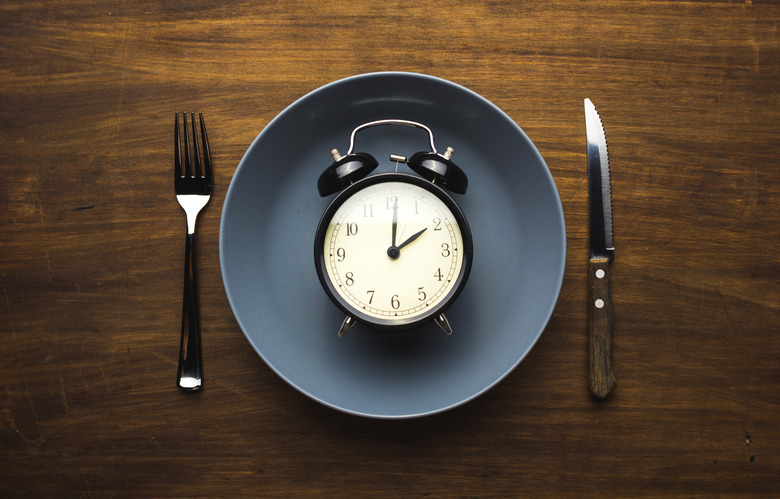Intermittent Fasting Is Totally Insane
Imagine waking up at 6 a.m. and not eating all day. At 4 p.m., you look at the clock, take a deep breath, and inhale 2,000 calories of food as fast as you physically can. You don't eat again until the following night.
That's intermittent fasting.
And it's being mistaken for "health" online, in gyms, and even in nutritionists' offices — more and more each day. I overheard personal trainers recommending it to their clients at my gym. I was invited to a wellness conference where it was the keynote topic. It's buzz-worthy, trending, and even my mom has heard of it.
Yeah, let that last one sink in. This health trend is a really big deal.
Of course, not everyone who intermittently fasts follows this exact regimen. Intermittent fasting is a concept: That there are ways to manipulate your hunger cues and metabolism by fasting, and that these methods will help you lose weight. Seems simple, right?
But the trend itself has become so insane. Here's why.
It sounds extremely uncomfortable.
Normal eating and normal hunger cues tell us to eat every three to four hours. This is what most people do. For example, they might eat a breakfast around 8 a.m., lunch around noon, some snacks before dinner, and a nice evening meal. When I put it like that it sounds obvious. That's because it's balanced. It's intuitive. It works.
Intermittent fasting turns all of that on its head.
It takes your intuition and tries to reverse it. Instead of listening when you're hungry, you're supposed to bury that feeling to the ground. Sometimes for hours. Sometimes for days.
During periods of fasting, black coffee, calorie-free sweeteners, diet soda, and sugar-free gum are permitted. I'm going to take this opportunity to point out that these calorie-free "hunger remedies" are flagged as warning signs of anorexia by the International Journal of Eating Disorders.
Of course, partaking in the diet won't give you an eating disorder. That's not my point. But I do think the correlation is a bit concerning.
There are a few different iterations of the plan.
One is to alternate days of eating. Eat whatever you want one day, fast for the entirety of the next. I've practiced Yom Kippur, the Jewish holiday where we communally fast for one whole day, and I can tell you from experience that that s— is not fun. For the holiday, it's not meant to be. You're lethargic and sorrowful, and you spend the day in religious services atoning for sin. But to do that to your body every other day in the name of weight loss? No, thank you.
Another is to only allow eating within a certain time window. The windows of time range from 10 hours to 4 — and all involve fitting in your calorie count into a discrete time frame. Many dieters subscribe to the 4-hour plan. That's the regimen described at the beginning of this post. A day's worth of calories is a whole lot of food; to fit it all in within 4 hours is going to take some work. It's a prescribed binge — wolfing down as much food as you can until you feel sick, and then restricting yourself from eating until you can do it again.
There are other iterations, as well — some of which involve 36-hour fasts, "cheat days," or other odd dietary practices prescribed in the name of metabolic disruption.
The plans all have one thing in common: They're extremely uncomfortable. And that's the point.
There's some real cause for concern.
Such an extreme dietary regimen is unsettling. Prioritizing a diet over the usual practices of everyday life is a cause for alarm and concern for the mental health of the dieter.
Imagine sitting through a workday without having eaten in 30 hours. Imagine skipping dinner with friends because you'd eaten your day's worth of calories at 2 p.m. These are some very plausible realities of intermittent fasting — and I haven't even dared to think about the digestive nightmare it could cause.
Large numbers of people going without food for extended periods of time has many scientists worried about the health costs for the fasters.
"Skipping meals ramps up your stress hormone cortisol, which I consider a dark lord of metabolism," Sara Gottfried, M.D., told the Huffington Post. Essentially, it messes with your system. Who knows what happens to your metabolism when you practice this diet in the long-term?
No one does, because there hasn't been enough research.
But there has been research that shows prolonged periods of hunger can lead to:
- Binge eating
- Emotional and personality changes
- Obsession with food
- Metabolism disorders
- Weight gain
Do people really want to try messing with their metabolism and eating psychology to maybe lose a little weight?
Apparently yes, they do.
It doesn't even work.
There is no evidence that the diet works better to promote weight loss in the long-term. One study, which followed dieters for a year, found that those who tried intermittent fasting lost the same amount of weight as dieters who restricted calories each day. Ten percent more dieters dropped out of the program completely when they intermittently fasted. (I don't blame them.)
"Alternate-day fasting does not produce superior weight loss or weight maintenance compared with daily calorie restriction," the results of the study read.
And it sucked so much to even try that a third of the intermittently fasting participants quit.
And yet, increasingly large amounts of people are going on these wacky diets. They're becoming normalized. People are recommending them, talking about them with their doctors. But the diet itself is totally insane — hopefully, this diet fad will soon bite the dust.
Holly Van Hare is the Healthy Eating Editor at The Daily Meal with a passion for podcasting and peanut butter. You can listen to her podcast Nut Butter Radio on iTunes and follower her health food Instagram @eating_peanut_better.
